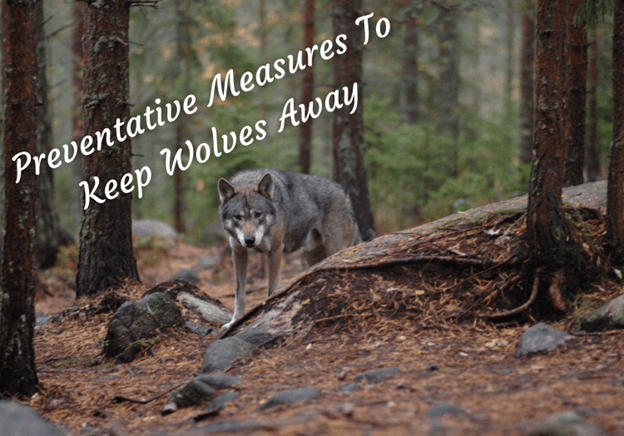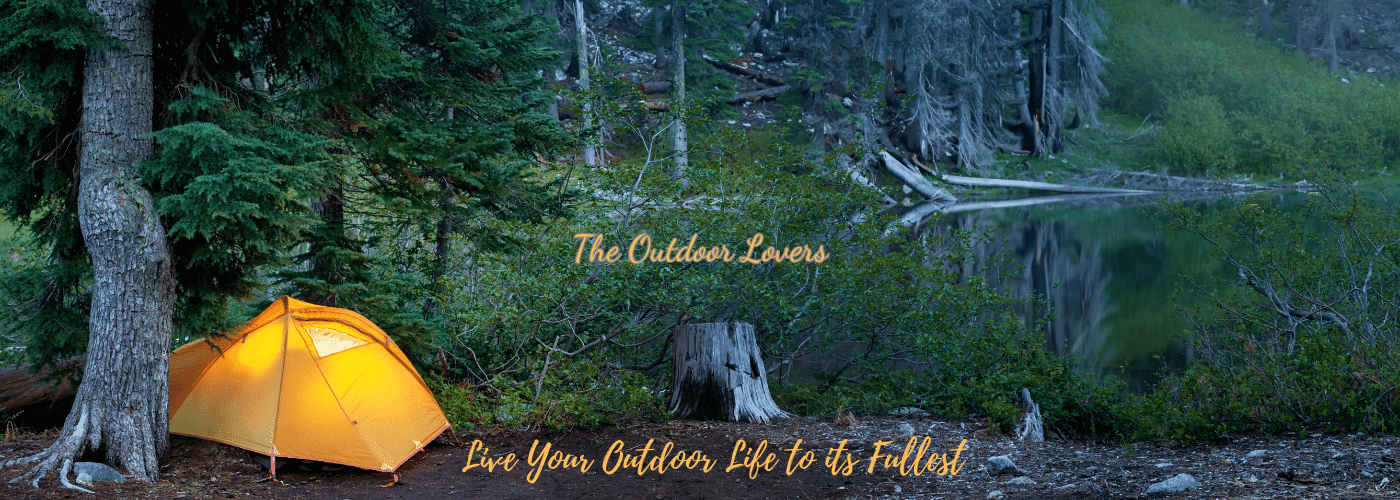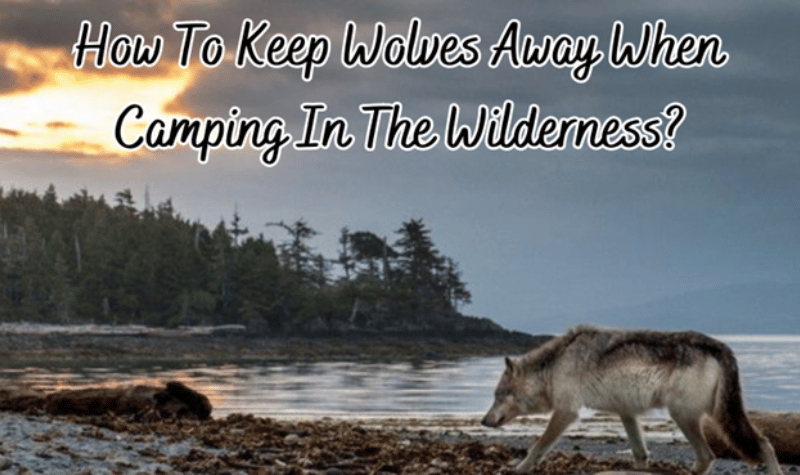One of the concerns that campers have is coming across wild animals and fighting for their lives in the wilderness. While this is a genuine issue, campers must remember that they, too, have responsibilities. They are, after all, the ones entering foreign territory. If the animals are afraid, they act on basic animal instinct–to protect themselves.
The International Wolf Center conducted research showing that wolves were not responsible for any human fatalities in the twentieth century. So, by knowing how to keep wolves away, you eliminate most of the risk of an encounter.
To emphasize that wolves do not pose a danger to human safety, the research said that “someone living in wolf territory has a higher risk of being killed by a dog, thunder, a bee sting, or a car accident with a wild animal than being injured by a wolf.”
While this provides some relief to many campers, they must still take their role seriously. Suppose they are camping in a wolf habitat. In that case, they should learn more about the area they want to camp in and the possibility of a wolf encounter.
Wolf attacks on people are very unusual. However, a wolf’s conduct will be determined by the behavior of the campers or humans nearby. Wolves will not pose a serious threat if people know how to behave while camping in the wolf area.
This article goes into this topic by providing useful recommendations on keeping wolves away when camping in the wilderness. Continue reading to find out how.
How to Keep Wolves Away When Camping
Understanding Wolves:
Overview Of Wolves’ Behavior In The Wild
The wolf is a carnivore that hunts, kills, and eats other animals. Wolves mainly hunt enormous, hoofed creatures known as ungulates. These ungulates have evolved with wolves by having a strong sense of smell, focused hearing, agility, speed, and pointed hooves.
Wolves hunt on vulnerable individuals, such as weak, ill, elderly, or young animals or healthy creatures hampered by heavy snow since these prey are well suited to defending themselves.
Wolves contribute to the health of their prey population by murdering weaker creatures one at a time. When inferior animals are destroyed, the prey population is reduced, and there is more food for the healthier animals to feed on.
Common Misconceptions About Wolves
• Wolves Are Dangerous To Humans:
Wolves are wild creatures and apex predators with the potential to harm people. The fact is that wolves are seldom seen by humans, and try to avoid them. The US has only had three fatal wolf attacks in the last century.
While wolves are capable of causing harm, the statistics do not support the notion that they are dangerous to humans. Domestic dog attacks kill many more people each year.
• Wolves Hunt For Sport:
Hunting requires tremendous energy and may be dangerous for any animal. Wolves should not hunt for any purpose other than to satisfy their basic need to feed. Even though wolves have extraordinarily long lifespans and can move for longer periods, they would not misuse energy on excess kills.
Many hunts or pursuits for prey are often fruitless. As a result, wolves do not have the energy to spend hunting for pleasure or recreation.
In the wild, having the energy to be vigilant, alert, and moving is important for life. Therefore, wolves hunting for fun or sport would do more damage than good.
Different Types Of Wolves That Campers May Encounter
If you are an active traveler who enjoys hiking or camping alone, you should avoid locations where wolves are popular. If feasible, visit wolf territories during the day to check your surroundings.
You should be aware of the various wolf varieties since their degrees of dislike and hunting behaviors differ.

The Gray Wolf
In comparison to other species, the gray wolf is believed to be the most unfriendly. The gray wolf is a fierce predator that loves to attack in groups.
The Red Wolf
Regarding its prey, the red wolf likes to hunt alone. The red wolf hunts throughout the day and is less likely to attack people unless they are in close contact with their lair or offspring.
The Arctic Wolf
Another sort of wolf that is not unfriendly and prefers to live in the Arctic Circle is the Arctic wolf. The arctic wolf prefers to dig its food from beneath the snow rather than approach people.
Preparing For Camping Trip In Wolf Territory
Choosing The Right Camping Location
When camping in the wilderness, you should be extremely careful about where you stay. Choose a location where you will not meet wolves or where the number of wolves is low. Avoid floral areas since they give food and habitat to the said animals. Hiking through a botanical area will only draw wolves.
Researching The Area For Wolf Activity
Planning should always be your main responsibility, particularly before extended wilderness adventures. Camping in wolf territory may be especially difficult for people who need to prepare. As a result, you must ensure sufficient knowledge of the many parts of your trip.
What type(s) of wolves are active in the region you’ll be camping in, as well as the likelihood of seeing wolves so that you can assess the threat posed by wolves. Otherwise, planning a camping trip in Wolf Territory is comparable to preparing for a backpacking trip.
Packing The Right Equipment To Ward Off Wolves
There are ways you can use to put them at bay. When camping in wolf territory, you should have the following items in your arsenal:
• Because wolves dislike loud sounds, carrying a whistle with you always is a smart idea. Because wolves have keen hearing, whistles’ loud and penetrating sound will keep them away.
• Wolves are afraid of bright lights. So, if possible, carry a flashlight. A bonfire will also be useful at the camping.
• Having pebbles, twigs, or anything else you can throw at the wolves will be useful in the event of an encounter. Yes, even wolves dislike having stuff thrown at them.
• As an additional precaution, bring bear spray with you. Bear sprays are so powerful that they may deter a charging bear, so you might also use them on an aggressive wolf.
Creating A Plan For What To Do In Case Of A Wolf Encounter
Encounters with wildlife may be a pleasure of every camping trip, although some are more welcoming. Learn about resident wolves and the dangers they may pose. Follow all wolf interaction regulations, which include maintaining your distance, guarding your food supply, and not feeding them. Take all essential measures, such as immunizations, if required.
Preventative Measures To Keep Wolves Away:
If you’re camping in wolf territory or where they’re known to wander, you should take precautions to make your campsite undesirable to wolves. Here are a few ideas to start:

Proper Food Storage
The food smell is one of the few factors that attract wolves. Knowing this, you must properly dispose of rubbish, particularly food and odorous items. Pack them in plastic bags and seal them tightly. You may hang the bags so creepy crawlies cannot dig holes and spread waste. Also, burying the rubbish will not eliminate the odor.
Proper Waste Disposal
If you can find a campground with closed toilets, that’s a better option. If you still need to, you must also ensure you properly dispose of your garbage. Again, the scent of urine and droppings attracts wolves. Their curiosity may take them to your campground, or worse; they may believe you are being aggressive. Even the other species in the area may feel this way.
Setting Up Physical Barriers
More drastic precautions may be required to safeguard your camp in areas where wolves are plentiful. It is feasible to construct your electric fence around your camp.
An “Unwelcome Mat” is one barrier that has been proven to be effective. Unwelcome mats may be as simple as an electrically charged pad or as complex as screws, carpet tack, and wood, resulting in an irritation and uncomfortable, but a not permanently damaging, barrier.
Wolf proof containers are incredibly successful at keeping wolves away from your food. The odor may still escape, so store wolf canisters safely away from your tent.
Making Loud Noises To Scare Off Wolves
Make enough noise to frighten the wolves away if they attack. Screaming will arouse their predatory tendencies. Attempt tossing items within arm’s reach. Make yourself seem larger by swinging your arms about and making a lot of noise to scare the animals away.
Using Wolf Deterrents
If you’re going camping or trekking, one of the safety gear you should consider is bear spray, which might come in helpful if wolves attack.
Think you are in front of a wolf assault. The wolf will be scared away by a burst of the spray.
When they hunt in packs, the front lines distract the victim while the rest of the group attacks to demobilize it. If a pack of wolves approaches you, spray the ones closest to you first, then the ones farther back.
How To Act During A Wolf Encounter?
Your chances of seeing a wild wolf are minimal as there are so few of them and just one pack per thousand square miles. In the unlikely that you will come into a wolf in the wild, here are some precautions you should take.

Remaining Calm And Composed
If you encounter a wolf or a group of wolves, do not flee since this will activate their predatory urges. Defending yourself and showing them that you are not an easy target is essential. Make yourself as huge as possible and attempt to seem as big as possible.
Making Yourself Appear Larger
Raise your arms and unzip your jacket to make yourself look as big as possible. You may make yourself seem larger by waving your arms and standing tall. The wolf will believe you are a greater predator than they are.
Making Loud Noises
Clap your hands, blast your whistle, shout, and toss anything you can get your hands on (water bottles, stones, etc.) at the wolf if it doesn’t back down or stops being threatening towards you.
Avoiding Eye Contact With The Wolf
Directly staring at a wolf might be seen as hostility, threat, or challenge, particularly when confronted with a pack of wolves. All of the pack will stay in line.
Some of them will surround you; even if possible, gazing at them all at once would be difficult. Make a threat to the lead animal by raising it over your head if you’re wearing a jacket or stuff.
Slowly Backing Away From The Wolf
You may begin backing up gradually without turning your back on it. Your gaze remains fixed on the wolf even as you move away. Grab a couple of stones and throw them at the wolves before gently backing away.
Additional Resources
If you are looking for more tutorials, walkthroughs and troubleshooting about camping and enjoying the outdoors, here are some additional posts to check out:
Conclusion:
Every active hiker should know the guidelines for hiking and camping in wolf nations. Whether camping in wolf country or not, the danger is always associated. The main issue is understanding how to avoid attracting and repelling wolves.
You’ll get along nicely if you know how to act in their domain and respect them and their house. Don’t overthink or freak out. Remember that wolves are terrified of people. Therefore, you may take advantage of this without abusing it. Thanks for reading. If you think I forgot something or if you simply want to share a story or some advice, feel free to leave your comment below.! Be Safe and Have Fun!

